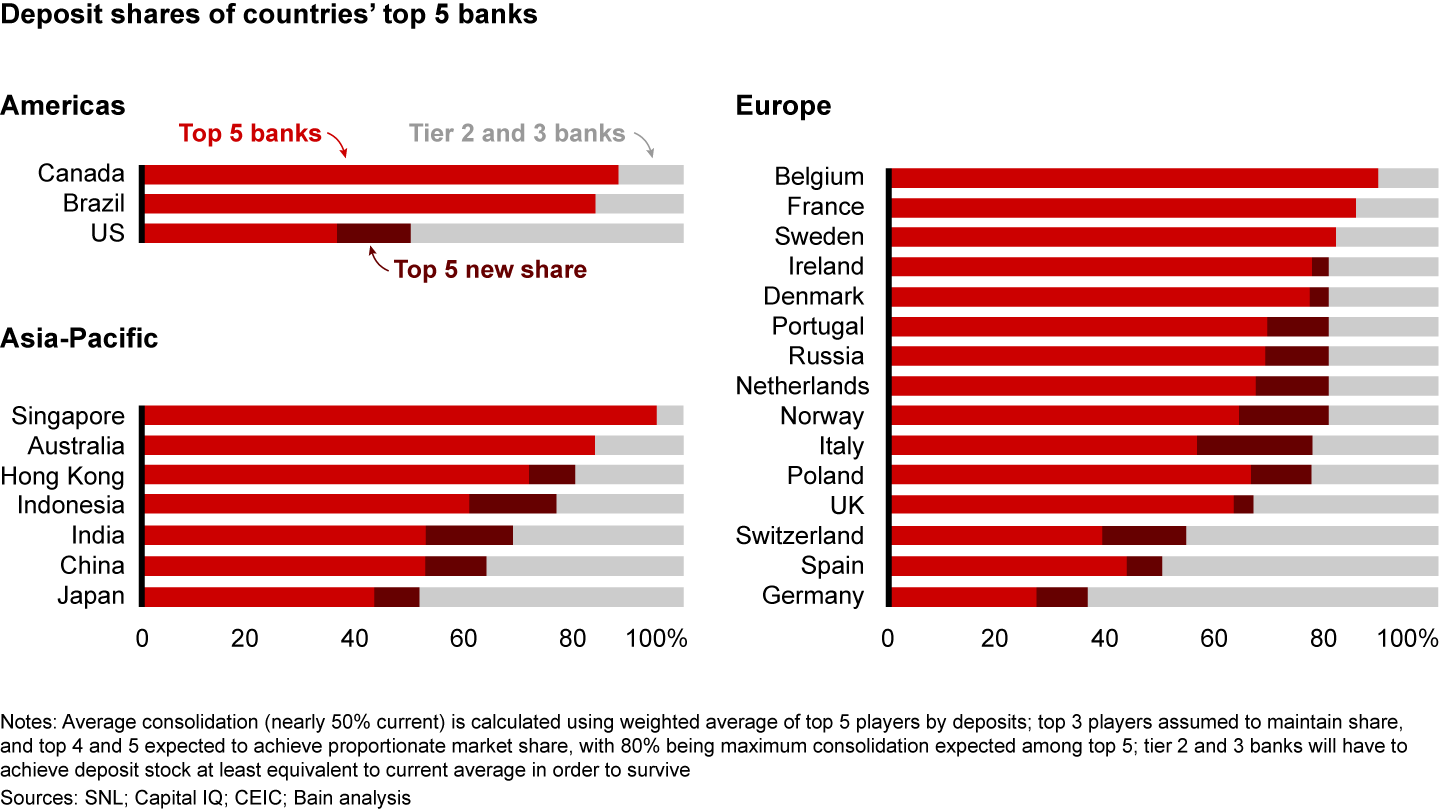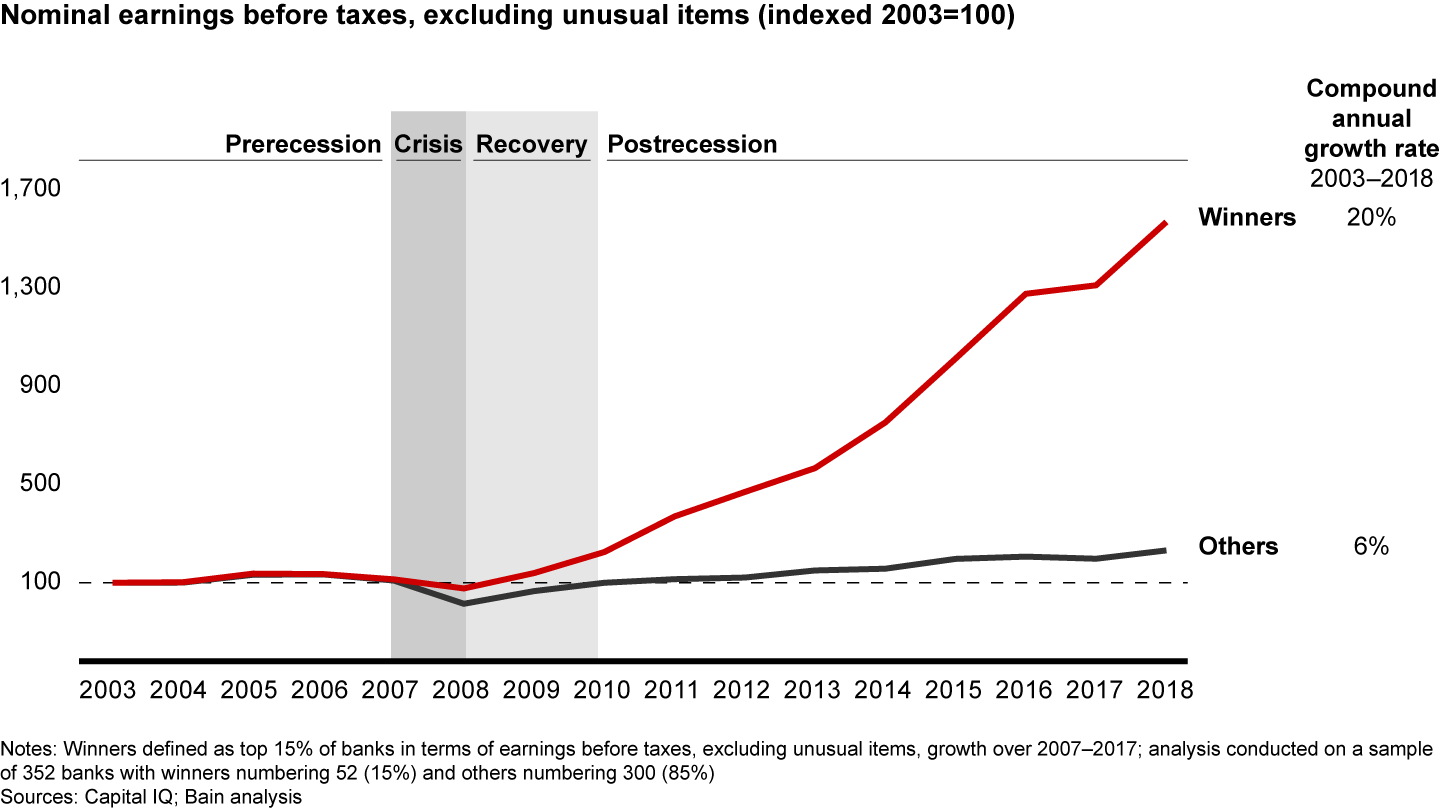M&A Report
 }
}
At a Glance
- The prospects are good for M&A in banking: Valuations have dropped, fragmentation prevails, regulators are supportive, and the downturn opened opportunities for stronger banks while weaker banks divest to survive.
- As scale becomes increasingly important to stay competitive, more banks will divest subscale noncore businesses.
- More banks will turn to scope deals that will help them upgrade their businesses for a digital future.
- An end to political hurdles and difficult regulatory frameworks might encourage a long-awaited era of cross-border banking deals.
Conditions are prime for banking deals
The banking industry is primed for an upswing in M&A activity. Valuations are dropping, with average price-to-book value decreasing by 35% globally in 2020. Even after gradual consolidation, banking remains a fragmented industry across all key markets, with the top five banks accounting for only 30% of total deposits in the US, 40% in the UK, and 38% in China.
Unlike many other industries, regulators are creating conditions and frameworks that favor consolidation. For example, the European Central Bank recently published guidelines for consolidation in the banking sector.
Finally, there is the impact of Covid-19. Despite government interventions, the economic fallout has caused banks that entered the pandemic in a weaker position than their competitors to weaken even further, widening the rift between the less healthy banks and those that have remained relatively robust despite substantial losses and lower capital ratios. The rift will create opportunities for stronger players to acquire and for weaker players with capital ratio gaps to look into their portfolios for potential businesses to divest. For example, in the US, almost 100 banks with more than $5 billion in assets started the crisis with already low profitability and balance sheet issues, and they will emerge even weaker out of the crisis.

A Wave of Deals on the Horizon in Banking?
The downturn and regulatory support in some geographies have created conditions ripe for consolidation.
Four trends will define banking M&A in 2021
As conditions ripen for M&A, we see four important deal-making trends.
A rise in domestic consolidation: A wave of domestic consolidation is already underway in Europe, with deals such as the more than €4 billion merger between Caixa and Bankia in Spain and the Intesa acquisition of UBI in Italy for around €5 billion. With the nearly $12 billion acquisition of BBVA USA, PNC will further consolidate its position as the fifth-largest bank in the US. Rising costs and regulatory support will spur domestic consolidation that will give rise to local champions. Through acquisitions, we expect the share of the top five banks in total deposits to increase by an average 10 percentage points, from around 48% to approximately 59% (see Figure 1).

More divestiture of noncore businesses: As costs mount and scale becomes increasingly important to stay competitive, banks will continue to divest businesses and operations that are noncore. Such divestitures might include businesses such as payments, asset management, and fund administration. Private equity (PE) funds and other financial sponsors will play an active role in restructuring and aggregating these businesses. That’s what they did in the payments sector in Europe with the €8 billion acquisition of Nets in the Nordics by PE-invested Italian payment giant Nexi, which itself was created from a bank divestiture.
Scope deals will deliver needed capabilities or technologies: With some fintechs facing the risk of funding shortages and sellers willing to take advantage of rising high-tech multiples, banks will seize the opportunity to acquire new capabilities or technologies that help them adapt their businesses for a digital future that has been hastened by Covid-19. With its $13 billion acquisition of E*Trade, Morgan Stanley will gain further access to next-generation clients while also capturing digital capabilities.
Cross-border deals might become a reality: Cross-border deals have been in discussion for years but have not yet fully materialized in a banking industry that remains mostly local. The current economic environment and regulators’ favorable attitude, specifically Europe’s guidelines for capital and accounting frameworks, however, could remove traditional barriers, encouraging cross-border deal activity that builds regional champions.
Bain's Pierre de Raismes discusses the potential for successful M&A in banking this year.
How the best banks will prepare for deals that spur growth and value creation
Over the years, many banks developed strong M&A capabilities for sourcing and screening potential targets, performing due diligence, and integrating acquisitions.
The one area that will differentiate winning banks will be due diligence capabilities in which the best banks will act more and more like professional investors. As for PE funds, winners will be those that excel at quantifying standalone value and synergies while rigorously assessing all potential impacts of Covid-19, from shifting consumer behavior to the risk of an increase in nonperforming loans.
Recent banking deals such as the Caixa and Bankia merger showed that acquirers will perform a deep assessment of the potential for synergies in revenue, costs, and capital while also thoroughly assessing risk in the current environment.
The current downturn offers a unique growth opportunity. Looking back at the past 12 years, the 15% of banks that invested in growth during the great financial crisis managed to emerge stronger and outpace their competitors (see Figure 2). For banks looking ahead and considering the role of M&A in their strategy, the future really starts now.



